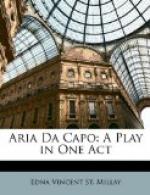[She picks up punch bowl.
They arrange chairs as before at ends
of table.]
PIERROT: Well, I don’t know. I think
it rather diverting
The way it is.
[Yawns, picks up confetti bowl.]
Shall we begin?
COLUMBINE: [Screams.] My God!
What’s that there under the table?
PIERROT: It is the bodies
Of the two shepherds from the other play.
COLUMBINE: [Slowly.] How curious to strangle
him like that,
With colored paper ribbons.
PIERROT: Yes, and yet
I dare say he is just as dead. [Pauses. Calls.]
Cothurnus!
Come drag these bodies out of here! We can’t
Sit down and eat with two dead bodies lying
Under the table! . . . The audience wouldn’t
stand for it!
COTHURNUS: (Off stage.) What makes you think
so?—
Pull down the tablecloth
On the other side, and hide them from the house,
And play the farce. The audience will forget.
PIERROT: That’s so. Give me a hand
there,
Columbine.
[PIERROT and COLUMBINE pull down the table cover in such a way that the two bodies are hidden from the house, then merrily set their bowls back on the table, draw up their chairs, and begin the play exactly as before.]
COLUMBINE: Pierrot, a macaroon,—I cannot live without a macaroon!
PIERROT: My only love,
You are so intense! ... Is it Tuesday,
Columbine?—
I’ll kiss you if it’s Tuesday.
[Curtains begin to close slowly.]
COLUMBINE: It is Wednesday,
If you must know. ... Is this my artichoke
Or yours?
PIERROT: Ah, Columbine, as if it mattered!
Wednesday. . . . Will it be Tuesday, then, to-morrow,
By any chance? . . .
[CURTAIN.]
AUTHOR’S NOTE
ON THE PLAYING PO
ARIA DA CAPO
ORIGINAL CAST
AS PLAYED BY THE PROVINCETOWN PLAYERS, NEW YORK CITY
PIERROT HARRISON DOWD
COLUMBINE NORMA MILLAY
COTHURNUS HUGH FERRISS
CORYDON CHARLES ELLIS
THYRSIS JAMES LIGHT
AUTHOR’S NOTE
So great is my vexation always, when reading a play, to find its progress constantly being halted and its structure loosened by elaborate explanatory parentheses, that I resolved when I should publish Aria da Capo to incorporate into its text only those explanations the omission of which might confuse the reader or lend a wrong interpretation to the lines. Since, however, Aria da Capo was written not only to be read but also to be acted, and being conscious that the exclusion of the usual directions, while clarifying the play to the reader, may make it bare of suggestions and somewhat baffling to the producer, I am adding here some remarks which have been found of value in preparing it for presentation on the stage.




